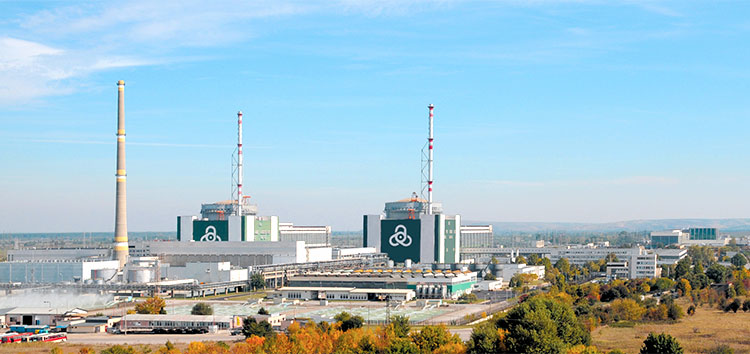
PLASMA PLANT IN BULGARIA

EBRD - In a breakthrough in the treatment and disposal of radioactive waste a plasma melting plant has started operations at the site of the Kozloduy nuclear power plant in Bulgaria. The results of the successful operational testing were presented to the donor community at the meeting of the Assembly of Contributors of the EBRD-managed Kozloduy International Decommissioning Support Fund (KIDSF) today.
Using plasma technology, the facility will significantly reduce the volume of low- and intermediate-level radioactive waste from the Kozloduy reactors 1 to 4, which were shut down between 2002 and 2006, and reactors 5 and 6, which are in operation.
The plant has a capacity of up to 250 tonnes per year. In the plasma, metals are melted and oxidised. Concrete debris, sand, inorganic granulates, insulation material and asbestos are melted. They are transformed into a chemically inert and amorphous glassy slag. Liquids and organic materials are vapourised so the final product is organics-free.
The technology allows for treatment of waste with a minimum risk of radioactive contamination. As the final waste form is free from organics and liquids, it will meet strict quality and stability requirements for long-term storage or final disposal. Also historical radioactive waste conditioned in a bituminous or concrete matrix can be retreated in a plasma facility which makes the new technology potentially widely applicable beyond Kozloduy.
The Bulgarian nuclear power plant is home to six Soviet-designed reactors. Units 1 to 4 are VVER-440 reactors which are currently being decommissioned with the support of the international donor community led by the European Union through the KIDSF, which is managed by the EBRD.
The plasma plant will treat waste from both units in decommissioning and units in operation. A new national radioactive waste repository is under construction and commissioning is scheduled for 2021.
The facility is a joint venture of Iberdrola Ingeniería y Construcción (Spain) and Belgoprocess (Belgium), with Iberdrola the engineering company and Belgoprocess the process provider. The total cost of the plant is about €31 million, 35 per cent of which is funded by the government of Bulgaria and 65 per cent by the KIDSF.
It will be operated by the State Enterprise Radioactive Waste (SERAW) entity, which is responsible for the decommissioning of Kozloduy units 1 to 4 and the national radioactive waste disposal facility.
The KIDSF was established at the EBRD in 2001. More than €900 million has been contributed largely by the European Commission as well as by Austria, Belgium, Denmark, France, Greece, Ireland, the Netherlands, Spain, Switzerland and the United Kingdom. The fund finances and co-finances decommissioning projects in Kozloduy and projects to reform and modernise the supply and demand side of energy use in Bulgaria.
Among other things, the fund has financed energy efficiency measures such as the rehabilitation of the district heating network in Sofia, Pernik and Varna, the energy efficiency rehabilitation of 340 public buildings and street lighting in 40 municipalities across Bulgaria.
-----
Earlier:

2016, September, 19, 18:35:00
EBRD BOUGHT BULGARIAPresident Chakrabarti welcomed Bulgaria’s recent actions to strengthen the stability of its financial sector and promote the liberalisation of the energy market. He reconfirmed the EBRD’s commitment to support these reforms with investment and technical advice. |

2016, August, 26, 18:30:00
BULGARIA'S GAS HABBulgaria’s prime minister Boyko Borisov proposed the gas hub, to be built near the city of Varna, days after Russia scrapped the Gazprom-led South Stream pipeline project over objections from the EC, suggesting a different idea of what a hub is from the conventional, virtual trading point such as the Dutch title transfer facility. |

2016, February, 20, 21:15:00
EUROPEAN GAS COMPETITIONWith more or less fanfare, several countries in the region have at one time or another announced their intention to become a gas hub. Greece, Turkey, Bulgaria and Romania have generally been the most vocal, though neither ever provided the specifics of what their respective hub proposal looks like. |

2015, December, 11, 19:50:00
BULGARIA & GREECE AGREEDThe 180-km (110-mile) pipeline will be built by a Bulgarian-Greek joint venture that also includes Italian energy group Edison SpA. |

2015, December, 3, 19:45:00
TURKISH STREAM FALLINGGazprom has already spent €1.8bn on purchasing physical pipe for the first and second “strings” - or lines, of pipe to be laid under the Black Sea. Pipe, delivered by Germany’s Europipe and Russia’s United Metallurgical Company (OMK) under the first string contract, signed in January 2014, is now largely stashed on the wharves of the Bulgarian port of Varna. The fate of pipe ordered for the second string, under contracts placed in March 2014, is not known. |

2015, December, 1, 19:45:00
BULGARIA SUPPORTS RUSSIA"I will defend the position for the construction of Nord Stream II and (a) gas hub in Bulgaria - it is advantageous for the country and nobody can reproach me for that," Borisov told reporters. |

2015, August, 28, 18:15:00
BULGARIA'S DAMAGESBulgaria’s Cabinet was preparing to seek damages for the idled properties that were due to host infrastructure for the now-abandoned South Stream gas pipeline, with the government approving on August 26 the methodology for calculating such damages. |





